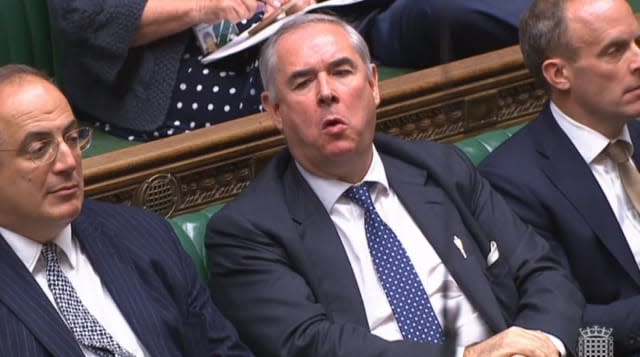Geoffrey Cox: Supreme Court judgment was not ‘constitutional coup’

The Government’s top law officer has rejected claims from Jacob Rees-Mogg that the Supreme Court judgment was a “constitutional coup”.
Attorney General Geoffrey Cox – addressing MPs with Commons Leader Mr Rees-Mogg watching on – said there may have been some “rhetorical or poetical licence” in comments made about the case.
Meanwhile Justice Secretary Robert Buckland defended the “world-class judiciary” in the wake of the decision, saying personal attacks are “completely unacceptable”.
Mr Rees-Mogg’s comments were reportedly made during an emergency Cabinet conference call to discuss the Supreme Court judgment that the suspension of Parliament was unlawful.
Mr Cox told MPs “I don’t think it was a constitutional coup” and “I do not believe that anybody does”.
He added: “These things can be said in the heat of rhetorical and poetical licence.”
We must all remember that our world-class judiciary always acts free from political motivation or influence and that the rule of law is the basis of our democracy, for all seasons. Personal attacks on judges from any quarter are completely unacceptable.
— Robert Buckland QC MP (@RobertBuckland) September 25, 2019
The comments by Mr Cox and Mr Buckland followed warnings from former justice secretary David Gauke that the fall-out from the decision must not turn into a “populist attack on the judiciary”.
In a tweet, Mr Buckland said: “We must all remember that our world-class judiciary always acts free from political motivation or influence and that the rule of law is the basis of our democracy, for all seasons.
“Personal attacks on judges from any quarter are completely unacceptable.”
He previously said the Government respects the judgment, the judicial process and the rule of law even though it “respectfully disagrees” with the court’s decision.
Meanwhile, Cabinet minister Michael Gove acknowledged there had been “heated responses” to the ruling.

But when asked whether reports of Mr Rees-Mogg’s comments were incorrect, the senior cabinet minister said he did not “recognise” the language.
He told Radio 4’s Today programme: “It is perfectly possible to disagree with some of the reading, but at the same time to respect the rule of law and to say that when the Supreme Court rules on a matter like this, of course we have to obey these principles.”
The former Supreme Court justice Lord Sumption, who retired last year, told the programme the ruling was not undermining democracy, adding: “The problem that we have here is that the Government itself has sought to undermine the democratic legitimacy of public decision-making.”
Writing in The Times he said the judgment was a result of “constitutional vandalism”, adding: “The court’s judgment, however, is concerned not with the political issues of Brexit but with the process by which those issues are to be resolved.
“Its effect is to reinstate Parliament at the heart of that process.”
He said it was “regrettable that it should have come to this, but better than leaving a void governed by neither convention nor law in which the Government can do what it likes”.
Mr Buckland has taken a different approach to that of Liz Truss, who when in the post of justice secretary in 2016 and 2017 came under fire from the most senior judge in England and Wales for failing to address abuse directed at the judiciary.
Three High Court justices were branded “enemies of the people” in a newspaper headline after ruling that triggering Brexit needed parliamentary approval, and subsequently became the subject of direct verbal abuse.


